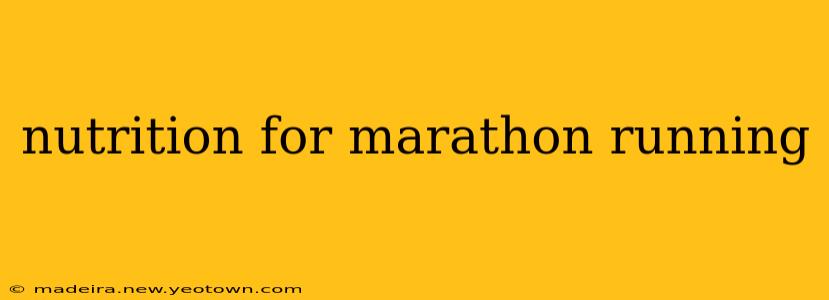The roar of the crowd, the pounding of your feet, the burning in your lungs – a marathon is a grueling test of endurance, pushing your body to its absolute limits. But before you even lace up your shoes, the battle is already half-won in the kitchen. Marathon running demands a meticulous approach to nutrition, a carefully orchestrated symphony of fueling, hydrating, and recovering. This isn't just about eating more; it's about eating smart. Let's dive into the science and strategy behind fueling your marathon journey.
What Should I Eat Before a Marathon?
The days, hours, and even minutes leading up to race day are critical. You're not just prepping for the 26.2 miles; you're setting the stage for your body's performance. The goal is to maximize glycogen stores (your body's readily available energy source) without causing digestive distress. Think easily digestible carbohydrates, paired with moderate protein for muscle repair and some healthy fats for satiety.
A common mistake is trying something new on race day. Stick to what you've practiced during your training runs.
Sample Pre-Marathon Meal Plan (adjust based on individual needs and training):
- Day Before: Focus on complex carbohydrates like whole grains (oatmeal, brown rice), lean protein (chicken, fish), and plenty of fruits and vegetables. Avoid high-fiber foods that could upset your stomach.
- Morning of: A light breakfast 2-3 hours before the race is ideal. Think toast with a thin layer of nut butter, a banana, or a small bowl of oatmeal.
- 1-2 hours before: A small, easily digestible snack like a gel or a small piece of fruit.
What Should I Eat During a Marathon?
During the marathon itself, maintaining consistent energy levels is paramount. You'll need to replenish your glycogen stores and prevent "hitting the wall." This is where gels, chews, sports drinks, and even real food can play a crucial role. Experiment with different options during your training to find what works best for your digestive system.
-
Hydration: Water is key. Don't wait until you're thirsty; sip consistently throughout the race. Sports drinks can also help replenish electrolytes lost through sweat.
-
Fueling: Gels and chews are convenient energy sources, but some runners prefer real food options like bananas or dried fruit.
What Should I Eat After a Marathon?
Post-marathon nutrition is equally important for recovery and replenishment. You've just depleted your glycogen stores and stressed your muscles; now's the time to rebuild.
-
Within 30-60 minutes: Consume a combination of carbohydrates and protein to replenish glycogen and repair muscle tissue. A protein shake with fruit or a sandwich with lean meat are good options.
-
Following Days: Continue to prioritize carbohydrate-rich meals to restock glycogen stores. Don't forget to stay hydrated.
How Many Calories Should I Eat as a Marathon Runner?
Calorie needs vary drastically depending on factors such as your weight, training volume, and metabolism. A general guideline is to increase your daily calorie intake proportionally to your training intensity and duration. Consulting a registered dietitian or sports nutritionist can provide personalized recommendations based on your specific requirements.
What Are the Best Foods for Marathon Runners?
The best foods are nutrient-dense and easily digestible. This means focusing on:
- Complex Carbohydrates: Whole grains, fruits, vegetables.
- Lean Protein: Chicken, fish, beans, lentils.
- Healthy Fats: Avocado, nuts, seeds.
What Supplements Do Marathon Runners Need?
While a balanced diet should provide most essential nutrients, some runners may benefit from specific supplements such as iron (for red blood cell production) or creatine (for muscle performance). Always consult with a doctor or registered dietitian before starting any new supplements.
This journey requires careful planning and meticulous execution. Remember, consistency is key. By focusing on the right nutrition strategy, you'll not only improve your performance but also enhance your overall health and well-being, allowing you to cross that finish line feeling strong and proud. Happy running!

